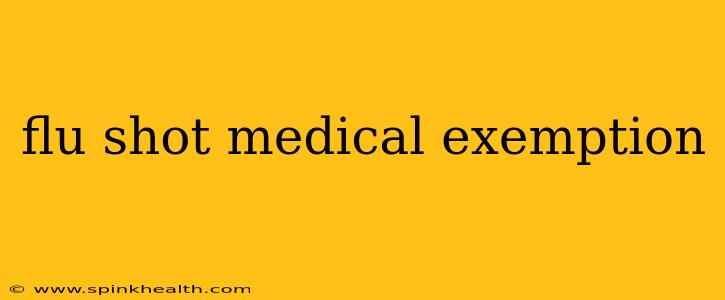The flu, or influenza, is a common viral infection that can cause mild to severe illness. Every year, millions get the flu, and thousands die from flu-related complications. The flu shot is a recommended preventative measure, significantly reducing your chances of contracting the virus or experiencing severe symptoms. However, some individuals may have genuine medical reasons for not receiving the vaccine. This post explores the topic of flu shot medical exemptions, addressing common questions and misconceptions.
Who Qualifies for a Flu Shot Medical Exemption?
This is a crucial question, and the answer isn't a simple "yes" or "no." A medical exemption isn't something you simply declare; it requires a doctor's assessment and diagnosis. A doctor will consider your individual medical history and current health status to determine if a flu shot poses a significant risk. There aren't broad categories; every case is unique. Generally, a medical exemption might be considered in cases involving:
- Severe allergic reactions to previous flu shots: A history of anaphylaxis (a severe, life-threatening allergic reaction) following a flu vaccine is a valid reason for exemption. This isn't a mild rash or slight swelling; it's a serious medical event requiring immediate medical attention.
- Guillain-Barré syndrome (GBS): This rare neurological disorder involves inflammation of the nerves, and there's a very small association with the flu vaccine. However, this link is incredibly rare, and the risk of getting GBS from the flu is far higher than from the vaccine. A doctor will carefully weigh the risks and benefits.
- Severe egg allergy: Many flu vaccines are grown in chicken eggs. Individuals with severe egg allergies might have a reaction to the vaccine. However, many individuals with egg allergies can safely receive the flu shot with proper medical supervision.
- Other underlying health conditions: Certain underlying health conditions, such as compromised immune systems or specific medical treatments, might make receiving the flu vaccine less advisable or require careful monitoring. This is a highly individualized assessment.
It's vital to understand that simply being "afraid of needles" or having a general distrust of vaccines isn't a valid medical exemption. These are anxieties that can be addressed, and the benefits of the vaccine far outweigh the risks for most people.
What are the Risks of Getting the Flu Shot?
This is a common concern, and it's essential to address the potential side effects, although it's important to remember the vast majority of people experience minimal to no side effects. Common side effects include:
- Soreness at the injection site: This is the most common side effect and usually subsides within a few days.
- Mild fever: A low-grade fever is possible, and over-the-counter medications can help alleviate symptoms.
- Muscle aches: Some people experience mild muscle aches for a day or two.
- Headache: Headaches are also a possibility, but typically resolve quickly.
These are generally mild and temporary, and they are far less severe than the potential complications of contracting influenza.
Can I get a religious exemption for the flu shot?
Religious exemptions for mandatory vaccination are typically not granted for the flu shot. While religious beliefs are protected, they usually do not override public health concerns. Influenza is highly contagious and poses a risk to the community.
What documentation do I need for a flu shot medical exemption?
You'll need documentation from your doctor confirming the medical reason for the exemption. This usually involves a note explicitly stating the specific medical condition and why the flu vaccine is contraindicated.
What are my options if I can't get the flu shot?
If you have a genuine medical reason, discussed and confirmed with your doctor, for not receiving the flu vaccine, there are other steps you can take to protect yourself from the flu. These preventative measures include:
- Practicing good hygiene: Frequent handwashing, covering coughs and sneezes, and avoiding close contact with sick individuals are vital.
- Staying home when sick: If you feel unwell, stay home from work or school to prevent spreading illness.
- Supporting your immune system: Maintaining a healthy lifestyle with proper nutrition, exercise, and sufficient rest supports a strong immune system.
Conclusion:
Medical exemptions for flu shots are rare and require a doctor's evaluation. The decision should be made based on a careful assessment of individual risk factors and a thorough discussion with your healthcare provider. The benefits of the flu shot significantly outweigh the risks for most individuals. Prioritizing preventive measures, including vaccination, is the best way to protect yourself and your community from the flu.

